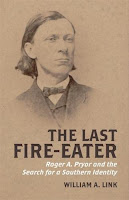New Arrival:
• The Last Fire-Eater: Roger A. Pryor and the Search for a Southern Identity by William A. Link (LSU Press, 2022).
In The Last Fire-Eater, historian William Link "examines the life of Roger A. Pryor, a Virginia secessionist, Confederate general, and earnest proponent of postwar sectional reconciliation whose life involved a series of remarkable transformations. Pryor’s journey, Link reveals, mirrored that of the South. At times, both proved puzzling and contradictory."
At less than a hundred pages of narrative, Link's book, which focuses of Pryor's public life, is not meant to be a full biography. For that Link recommends Robert Holzman's Adapt or Perish: The Life of General Roger A. Pryor, C.S.A. (1976) and John Waugh's Surviving the Confederacy: Rebellion, Ruin, and Recovery—Roger and Sara Pryor During the Civil War (2002). Emphasized is Pryor's life of transformation. This is reflected in the study's three-chapter structure examining in turn Pryor's pre-Civil War political career as a states' rights radical, his Confederate Civil War service, and the postwar reconciliationist period of his life.
From the description: "Pryor recast himself during a crucial period in southern history between the 1850s and the close of the nineteenth century. An archetypical southern-rights advocate, Pryor became a skilled practitioner in the politics of honor. As a politician and newspaper editor, he engaged in duels and viewed the world through the cultural prism of southern honor, assuming a more militant and aggressive stance on slavery than most of his regional peers. Later, he served in the Confederate army during the Civil War, rising to the rank of brigadier general and seeing action across the Eastern Theater. Captured late in the conflict, Pryor soon after abandoned his fiery persona and renounced extremism. He then moved to New York City, where he emerged as a prominent lawyer and supporter of the sort of intersectional detente that stood as a central facet of what southern boosters labeled the “New South.”"
The world that Pryor was born into and the one he left in death at age 90 were certainly very different. More from the description: "Dramatic change characterized Pryor’s long life. Born in 1828, he died four months after the end of World War I. He witnessed fundamental shifts in the South that included the destruction of slavery, the defeat of the Confederacy, and the redefinition of manhood and honor among elite white men who relied less on violence to resolve personal grievances." The Last Fire-Eater uses Roger Pryor's "lifetime of remakings" as a lens through which to also study the greater "history of transformation in the South."
Frankly, I wish there were more books like this. There are many Civil War figures of middle-range significance that I am interested in reading more about but not enough to tackle a 400-page full biography!


No comments:
Post a Comment
***PLEASE READ BEFORE COMMENTING***: You must SIGN YOUR NAME ( First and Last) when submitting your comment. In order to maintain civil discourse and ease moderating duties, anonymous comments will be deleted. Comments containing outside promotions, self-promotion, and/or product links will also be removed. Thank you for your cooperation.